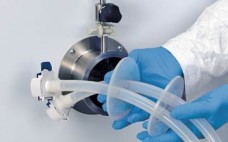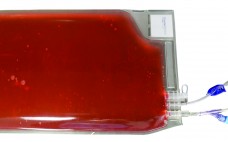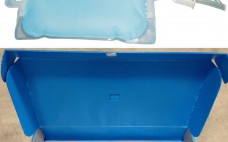This report explains how a wall pass-through system that incorporates Single-Use components can help speed and streamline operations, reduce contamination risks and maintain isolated environments.
Sponsored Content
Parallel Cultivation of Microorganisms Using Rigid Wall Single-Use Bioreactors
This webcast features: Dr. Sebastian Kleebank, development and application lab manager, DASGIP GmbH (part of Eppendorf AG) Single-use bioreactor solutions have been successfully established in animal and human cell culture in the last years. Currently this technology is investigated for microbial applications, especially for high cell density fermentations. Dr. Sebastian Kleebank demonstrates that reproducible process control could be achieved using single-use bioreactors operated in parallel.
Defining Non-Animal Derived Supplements for the Optimization of Mammalian Cell Culture Media Using DoE Methodologies
Optimization of chemically defined animal-derived component free media to culture mammalian cells and optimization of existing commercial media is possible with their supplementation with specific additives.
Efficacy and Utility of New EXP-Pak Closed-System Disposable Cell Expansion Bags Designed for Cell Therapy Applications
Clinical cellular therapy applications often times require a cell expansion or maturation step prior to use. Traditionally, cell expansion or cell culture is performed in “open” systems including multi-well culture dishes or tissue culture flasks. These “open” steps present risks and are not ideal for larger-scale manufacturing. The new EXP-Pak™ cell expansion container offered by Charter Medical, Ltd. is a closed-system, gas permeable bag intended for expansion and culture of non-adherent cells. The data demonstrate that the EXP-Pak™ cell expansion…
Dual-Chamber Syringes vs. Vials
Is there a clear choice between dual-chamber syringes and vials in today’s competitive drug development market? That’s the topic of this recorded webcast. During the webcast, the speakers address the following questions: What are the causative factors that have resulted in the rapid increase in prefilled syringes over the last several years? Do dual-chamber syringes offer distinct advantages over vials in drug development? How can dual-chamber technology help differentiate products in a highly competitive environment? What are the main differences…
Clinical Syringe Development: An Innovative Approach to Gain an Early Advantage
Do ever-rising drug development costs, highly competitive markets, and increasing regulatory demands sound familiar? This webcast addresses the benefits of starting syringe work earlier in the development process of injectables. This webcast will: Provide an overview of the many development challenges faced by pharmaceutical and biotechnology companies Discuss the benefits of clinical syringe development including time savings and package attractiveness Offer a case study with a live question and answer session Feature thought leaders Dr. David Brett and Dr. Sabine…
Freeze-Pak™ STS Bio-Containers and STS Shippers: Offering a New Single-Use Solution for Frozen Storage and Transport to -80°C
Frozen storage is commonly achieved with single-use containers and enables manufacturing process flexibility, long-term product stability and minimizes logistics challenges. While single-use containers are available for storage and transport of frozen products, some require a significant investment while others don’t offer the necessary support and protection. Charter Medical has recently developed a new single-use frozen storage and transport shipping solution designed to complement the single-use Freeze-Pak™ STS (FP-STS) bio-containers which were engineered specifically for frozen storage applications. The bags and…
Evaluation of HCP and DNA Clearance with NatriFlo™ HD-Q Membrane Adsorbers at Lab to Process Scales
NatriFlo™ HD-Q chromatography from Natrix Separations introduces reliable and reproducible Q polish performance that combines resin binding capacity with adsorber speed to achieve a new level of process flexibility. Gallus Biopharmaceuticals (a St. Louis based CMO) evaluated NatriFlo™ HD-Q membrane columns as an anion exchange polishing step with the objective of assessing NatriFlo’s ability to (1) reduce process-derived impurities to achieve target product profile; (2) maintain process robustness to process changes; and (3) achieve reliable scalability from lab to production.…
Use and Optimization of Chemically Defined Media Supplements in Mammalian Cell Culture Processes
The manufacture of biological therapeutics requires a recombinant cell line, a media system and process to produce the therapeutic, and a purification process. BD Advanced Bioprocessing specializes in the media system to produce the therapeutic, including cell culture media and a variety of different types of supplementation.There are many types of supplementation, from animal-origin and animal-free hydrolysates to chemically defined, and each biopharma needs to find the best supplementation for their systems’ requirements.
Chemically defined media supplementation has many benefits such as lot-to-lot consistency and reduction/elimination of the risk of animal-origin materials. However, to get optimal performance these supplements are not always as forgiving as a full-bodied hydrolysate.
This webinar will use the newly commercialized BD CD Resurge™ supplements as a case example on how to use and optimize CD supplements in mammalian cell culture processes.
Reducing the Host Cell DNA Quantitation Bottleneck: Approaches for Improved Sample Preparation and Throughput
The removal of impurities arising from host cells used for the production of biopharmaceutical products is a crucial step in the purification process. Regulatory guidance for products produced in cell culture specifies that residual host cell DNA content in the final product should be as low as possible. Because of the low sample throughput typical of most quantitative DNA assays, host-cell DNA quantitation can become an analytical bottleneck during process characterization.
In this webcast, speakers will discuss a qPCR-based system for highly sensitive, accurate quantitation of residual host-cell DNA from a variety of cellular production systems, including Chinese Hamster Ovary (CHO), E. coli and Vero cells. Case studies will be presented that demonstrate DNA recovery from highly complex test sample matrices, typical of those in biopharmaceutical manufacturing environments. Options for automated sample preparation, testing results from samples typical of a monoclonal antibody purification process and results from an external validation study, executed according to ICH guidelines, will also be reviewed.










